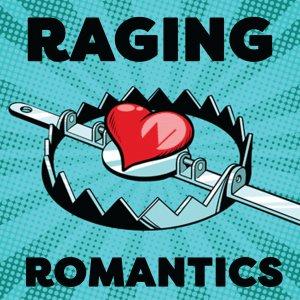Raging Romantics

#25 A (not-so-brief) Brief History of Romance
We're still here a year later! In honor of our first birthday we're diving backwards into time to look at the evolution of the romance genre, and romantic literature, throughout the ages. Spoiler alert...it goes back further than the 1970s. WAYYYYYY further. Break out your snacks and a notebook, it's time to go to school. Now, this is not an official history; ask a number of different literary historians and they will all have different answers. This is just Jackie and Jen's observational opinion as professional readers. Other historians observations/theories are linked down below!
Content Warning: discussion of rape and rape culture in earlier romance novels, language use,
The etymology of a "romance":
- Romance novel-first attested to as a description for a novel in 1964- focused on the development of a romantic relationship; DERIVED FROM:
- Romance literature-extended in the 17th century to refer to love stories; DERIVED FROM:
- Romaunce - ca. 1300CE meaning "a story, written or recited, of the adventures of a knight, hero, etc., often one designed principally for entertainment." These medieval vernacular tales usually told chivalric adventures full of marvelous incidents and heroic deeds. In reference to literary works, often in Middle English meaning ones written in French but also applied to native compositions; DERIVED FROM:
- Romanz - Old French, originally an adverb, "in the vernacular language;" DERIVED FROM:
- Romanice Scribere - Vulgar Latin meaning "to write in a Romance language" (one developed from Latin instead of Frankish); DERIVED FROM:
- Romanicus - Latin meaning "of or in the Roman style;" DERIVED FROM
- Romanus - Latin meaning "Roman
Terms:
- HEA - Happily Ever After
- HFN - Happily ever after for now
- Oral Tradition -
- Oral tradition, or oral lore, is a form of human communication wherein knowledge, art, ideas and cultural material is received, preserved, and transmitted orally from one generation to another. The transmission is through speech or song and may include folktales, ballads, chants, prose or verses.
- Chivalric Tales
- A type of prose or verse narrative that was popular in the aristocratic circles of High Medieval and Early Modern Europe. Chivalric romances celebrate an idealized code of civilized behavior that combines loyalty, honor, and courtly love.
- Gutenberg Printing Press
- Reformation
- Renaissance
- English Renaissance
- Romanticism
- An attitude or intellectual orientation that characterized many works of literature, painting, music, architecture, criticism, and historiography in Western civilization over a period from the late 18th to the mid-19th century.
- Gothic Literature
- European Romantic pseudomedieval fiction having a prevailing atmosphere of mystery and terror.
- Regency
- For more information on the regency period, see Raging Romantics episode 13
- Age of Revolutions
- Dime Store Novel
- Serials
- Serials are print or non-print publications issued in parts, usually bearing issue numbers and/or dates. A serial is expected to continue indefinitely. Serials include magazines, newspapers, annuals (such as reports, yearbooks, and directories), journals, memoirs, proceedings, transactions of societies, and monographic series.
- Penny Dreadful
- Mills & Boon
- Harlequin
- Bodice Ripper
- A historical romance novel with a very specific type of cover- usually depicting the heroine swooning in the hero's arms, and her dress/bodice has been ripped.
- BDSM
- Short for Bondage and Discipline, Dominance and Submission, Sadochism and Masochism. For more info on this see Raging Romantics episode 15
Stories/Books/Legends we mention:
- Pamela
- Tristan and Iseult
- Sir Gawain and the Green Knight
- Romeo and Juliet
- Midsummer Night's Dream
- Pride and Prejudice
- Hunchback of Notre Dame
- Frankenstein
- Wuthering Heights
- Les Miserables
- Flame and the Flower
- Fifty Shades of Grey
Authors:
- Emily and Charlotte Bronte
- Victor Hugo
- Tessa Dare
- Nora Roberts
- Danielle Steel
- Sandra Brown
- Beverly Jenkins
- Karen Marie Moning
- Sherrilyn Kenyon
- Christine Feehan
Articles we read:
- "James Patterson: Is the world's bestselling author the main writer?" (O'Sullivan, 2017)
- "Evolution of the Romance Novel" (Harber, 2013)
- "A Brief History of the Romance Novel" (Pagan, 2019)
- The myth of Tristan and Iseult (britannica.com)
- The History of Publishing (britannica.com)
- "American Dime Novels 1860-1915" (Pope, n.d.)
- "Why We Still Call Them Bodice Rippers" (Higgs, 2017)






 Visit Podcast Website
Visit Podcast Website RSS Podcast Feed
RSS Podcast Feed Subscribe
Subscribe
 Add to MyCast
Add to MyCast